The war in Ukraine and associated U.S. sanctions are exacerbating a world hunger crisis that already afflicts billions of people, writes Vijay Prashad.
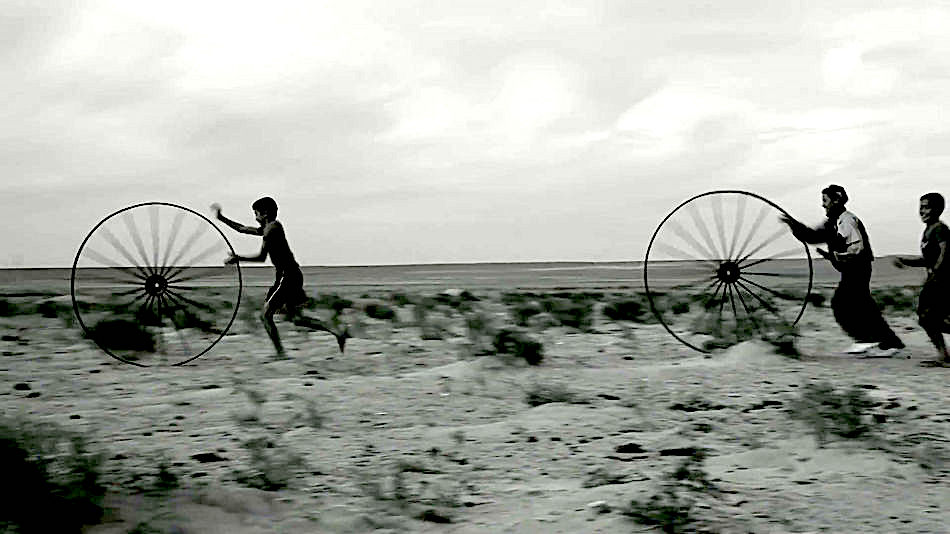
Almagul Menlibayeva, Kazakhstan, “Transoxiana Dreams,” 2010.
By Vijay Prashad
Tricontinental: Institute for Social Research
 On March 16, as Russia’s war on Ukraine entered its second month, Kazakhstan’s President Kassym-Jomart Tokayev warned his people that “uncertainty and turbulence in the world markets are growing, and production and trade chains are collapsing.”
On March 16, as Russia’s war on Ukraine entered its second month, Kazakhstan’s President Kassym-Jomart Tokayev warned his people that “uncertainty and turbulence in the world markets are growing, and production and trade chains are collapsing.”
A week later, the United Nations Conference on Trade and Development (UNCTAD) released a brief study on the immense shock that will be felt around the world due to this war. “Soaring food and fuel prices will have an immediate effect on the most vulnerable in developing countries, resulting in hunger and hardship for households who spend the highest share of their income on food,” the study noted.
South of Kazakhstan, in the Kyrgyz Republic, the poorest households already spent 65 percent of their income on food before these current price hikes; as food inflation rises by 10 percent, the impact will be catastrophic for the Kyrgyz people.
After the fall of the Soviet Union in 1991, immense pressure was brought to bear on the countries of the Global South to disband their food security and food sovereignty projects and to integrate their production and consumption of food into global markets. In his recent address, President Tokayev announced that the Kazakh government was now going “to oversee the production of agricultural equipment, fertilizers, fuel, and the stocks of seeds.”
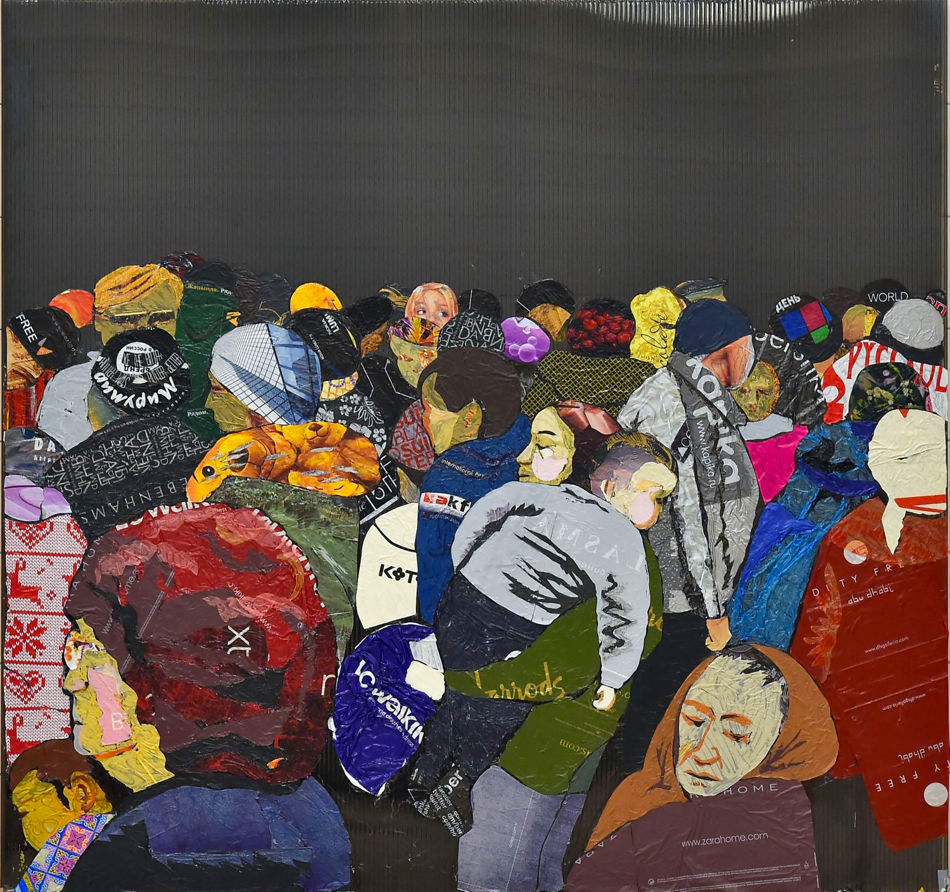
Saule Suleimenova, Kazakhstan, “Skyline,” 2017.
While 22 percent of world cereal production crosses international borders, Big Agriculture controls both the inputs for cereal production and the prices of cereals. Four corporations – Bayer, Corteva, ChemChina and Limagrain – control more than half of the world’s seed production, while four other corporations – Archer-Daniels-Midland, Bunge, Cargill, and Louis Dreyfus – effectively set global food prices.
Very few countries in the world have been able to develop a food system that is immune from the turbulence of market liberalization (read our Red Alert no. 12 for more). Modest domestic policies – such as banning food exports during a drought or keeping high import duties to protect farmers’ livelihoods – are now punished by the World Bank and other multilateral agencies. President Tokayev’s statement indicates an appetite in the poorer nations to rethink the liberalization of the food markets.
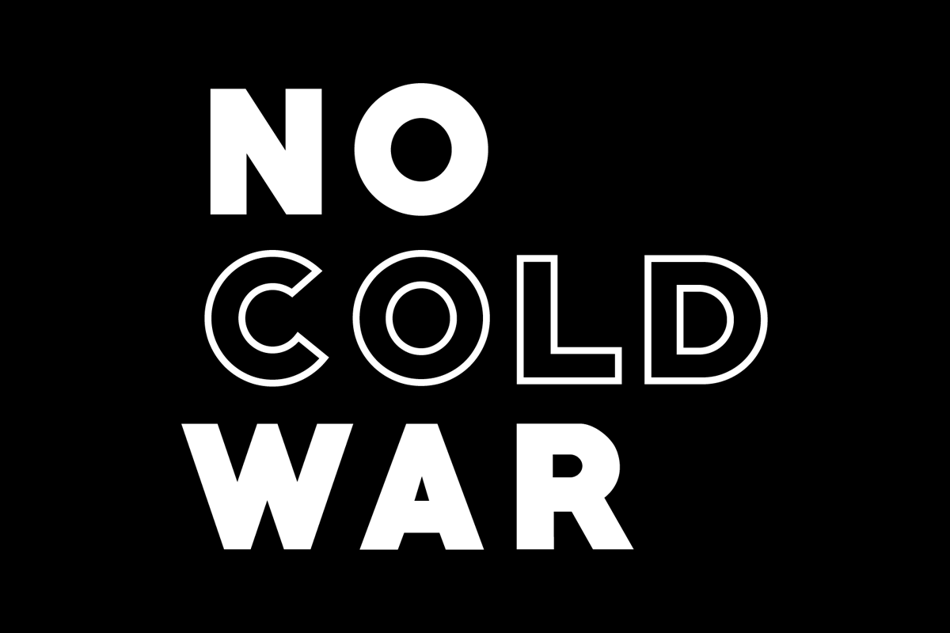 In July 2020, a statement titled “A New Cold War against China is against the interests of humanity,” was widely circulated and endorsed. No Cold War, the campaign which drafted the statement, has held a number of important webinars over the past two years to amplify discussions in Africa, Asia, Latin America and Europe on the impact of this U.S.-imposed pressure campaign against China, and on the racism that this has inflamed in the West.
In July 2020, a statement titled “A New Cold War against China is against the interests of humanity,” was widely circulated and endorsed. No Cold War, the campaign which drafted the statement, has held a number of important webinars over the past two years to amplify discussions in Africa, Asia, Latin America and Europe on the impact of this U.S.-imposed pressure campaign against China, and on the racism that this has inflamed in the West.
Part of No Cold War’s analysis is that these manoeuvres by the United States are intended to discourage other countries from commercially engaging with China, and also Russia. U.S. firms find themselves at a disadvantage compared to Chinese firms, and Russian energy exports to Europe are vastly cheaper than U.S. exports.
The U.S. has responded to this economic competition, not on a purely commercial basis, but treated it as a threat to its national security and to world peace. Instead of dividing the world in this manner, No Cold War calls for relations between the United States and China and Russia based on “mutual dialogue” centered “on the common issues which unite humanity.”
During this war on Ukraine, No Cold War has launched a new publication called Briefings, which will be factual texts on matters of global concern. Tricontinental: Institute for Social Research will share these periodic briefings in this newsletter (you can also find them here). For its first issue, No Cold War has produced the following Briefing, World hunger and the war in Ukraine.
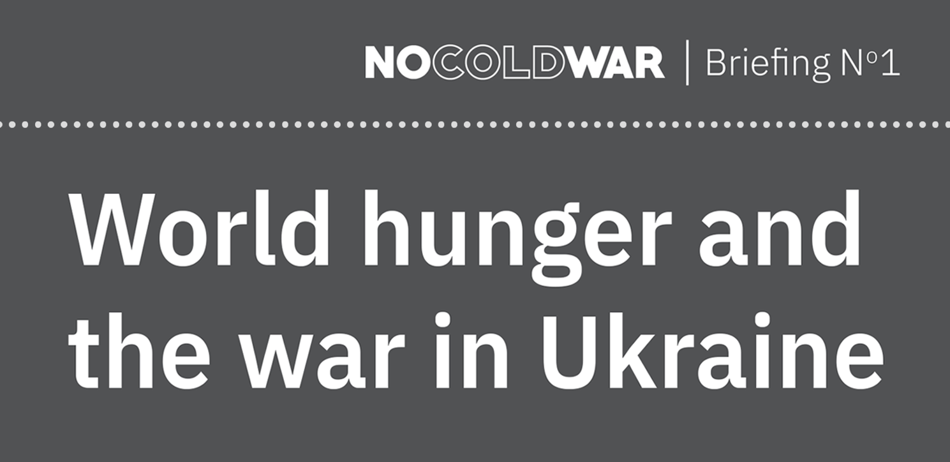 The war in Ukraine, along with sanctions imposed by the United States and Western countries against Russia, have caused global food, fertilizer and fuel prices to skyrocket and endanger the world food supply. This conflict is exacerbating the existing crisis of global hunger and imperils the living standards and well-being of billions of people – particularly in the Global South.
The war in Ukraine, along with sanctions imposed by the United States and Western countries against Russia, have caused global food, fertilizer and fuel prices to skyrocket and endanger the world food supply. This conflict is exacerbating the existing crisis of global hunger and imperils the living standards and well-being of billions of people – particularly in the Global South.
War in Breadbasket of World
Russia and Ukraine together produce nearly 30 percent of the world’s wheat and roughly 12 percent of its total calories. Over the past five years, they have accounted for 17 percent of the world’s corn, 32 percent of barley (a critical source of animal feed) and 75 percent of sunflower oil (an important cooking oil in many countries).
On top of this, Russia is the world’s largest supplier of fertilizers and natural gas (a key component in fertilizer production), accounting for 15 percent of the global trade of nitrogenous fertilizers, 17 percent of potash fertilizers, 20 percent of natural gas.
The current crisis threatens to cause a global food shortage. The United Nations has estimated that up to 30 percent of Ukrainian farmland could become a warzone; in addition, due to sanctions, Russia has been severely restricted in exporting food, fertilizer and fuel. This has caused global prices to surge. Since the war began, wheat prices have increased by 21 percent, barley by 33 percent and some fertilizers by 40 percent.
Global South ‘Getting Pummeled’
The painful impact of this shock is being felt by people around the world, but most sharply in the Global South. “In a word, developing countries are getting pummeled,” United Nations Secretary-General António Guterres recently remarked.
According to the U.N., 45 African and “least developed” countries import at least a third of their wheat from either Russia or Ukraine – 18 of those countries import at least 50 percent. Egypt, the world’s largest wheat importer, obtains over 70 percent of its imports from Russia and Ukraine, while Turkey obtains over 80 percent.
Countries of the Global South are already facing severe price shocks and shortages, impacting both consumption and production. In Kenya, bread prices have risen by 40 percent in some areas and, in Lebanon, by 70 percent. Meanwhile, Brazil, the world’s largest producer of soybeans, is facing a major reduction in crop yields. The country purchases close to half of its potash fertilizer from Russia and neighboring Belarus (which is also being sanctioned) – it has only a three month supply remaining with farmers being instructed to ration.
‘US Has Sanctioned Whole World’
The situation is being directly exacerbated by U.S. and Western sanctions against Russia. Although sanctions have been justified as targeting Russian government leaders and elites, such measures hurt all people, particularly vulnerable groups, and are having global ramifications.
Nooruddin Zaker Ahmadi, director of an Afghan import company, made the following diagnosis: “The United States thinks it has only sanctioned Russia and its banks. But the United States has sanctioned the whole world.”
‘Catastrophe on Top of Catastrophe’
The war in Ukraine and associated sanctions are exacerbating the already existing crisis of world hunger. The UN’s Food and Agriculture Organization found that “nearly one in three people in the world (2.37 billion) did not have access to adequate food in 2020.” In recent years, the situation has worsened as food prices have risen due largely to the Covid-19 pandemic, climate change and related disruptions.
“Ukraine has only compounded a catastrophe on top of a catastrophe,” said David M. Beasley, the executive director of the UN World Food Program. “There is no precedent even close to this since World War II.”
“If you think we’ve got hell on earth now, you just get ready,” Beasley warned.
Regardless of the different opinions on Ukraine, it is clear that billions of people around the world will suffer from this hunger crisis until the war and sanctions come to an end.
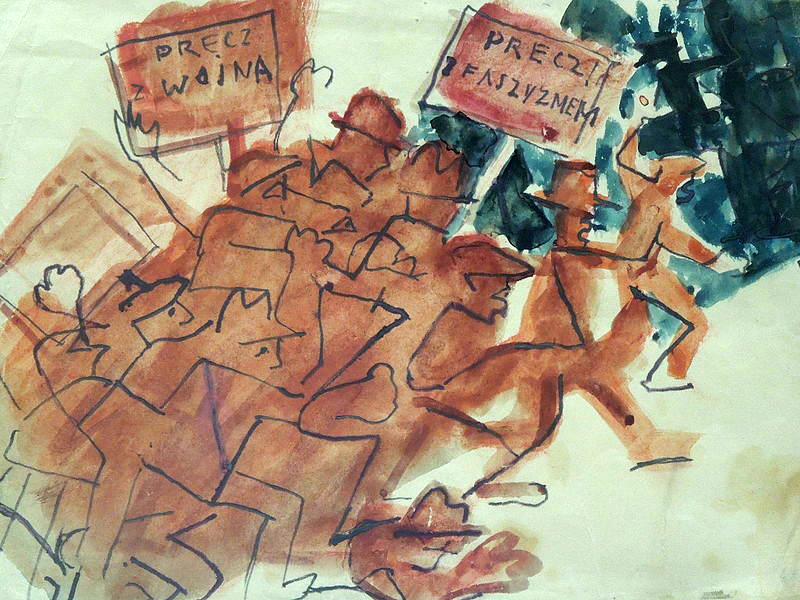
Stanislaw Osostowicz, Poland, “Antifascist Demonstration” (1932-1933).
In 1962, the Polish poet Wislawa Szymborska wrote “Starvation Camp Near Jaslo.” Located in south-east Poland not far from the Ukraine-Poland border, Jaslo was the site of a Nazi death camp, where thousands of people – mainly Jews – were caged and left to die of starvation. How does one write about such immense violence? Szymborska offered the following reflection:
Write it down. Write it. With ordinary ink
on ordinary paper; they weren’t given food,
they all died of hunger. All. How many?
It’s a large meadow. How much grass
per head? Write down: I don’t know.
History rounds off skeletons to zero.
A thousand and one is still only a thousand.
That one seems never to have existed:
a fictitious fetus, an empty cradle,
a primer opened for no one,
air that laughs, cries, and grows,
stairs for a void bounding out to the garden,
no one’s spot in the ranks …
Each death is an abomination; including the 300 children who die of malnutrition every hour of every day.
Vijay Prashad, an Indian historian, journalist and commentator, is the executive director of Tricontinental: Institute for Social Research and the chief editor of Left Word Books.
This article is from Tricontinental: Institute for Social Research.
The views expressed are solely those of the author and may or may not reflect those of Consortium News.

I really hate to say ‘Brilliant,’ given the topic, but….don’t forget the Pandora Papers, which report as follows about the UKR victims’ Great Leader:
‘The secret records also show that Ukraine’s President Volodymyr Zelenskiy and his close circle were the beneficiaries of a network of offshore companies, including some that owned expensive property in London, the OCCRP reported.
‘It said Zelenskiy and his partners in a television production company, Kvartal 95, set up a network of offshore firms dating back to at least 2012. Among other things, the offshore firms were used by Zelenskiy’s associates to purchase three prime properties in the center of the British capital
‘The documents also show that just before he was elected in 2019 on a wave of public anger against the country’s political class, Zelenskiy transferred his stake in a secret offshore company to his business partner, who later became his top presidential aide.
‘And an arrangement was soon made that would allow the offshore firm to keep paying dividends to a company that now belongs to Zelenskiy’s wife.
‘A spokesman for Zelenskiy declined to comment.’
hxxps://www.rferl.org/a/pandora-papers-tax-havens/31490744.html
Add this latest Chomsky revelation on short-term risks. I recently FW’d the google version of my ‘old’ accidental nuke war essay to him, a prime desideratum in his latest talk. Did not even know about his referenced WH summons and 9/21 ‘agreement’ with the little Z, which obviously set Putin off….
hxxps://www.youtube.com/watch?v=n2tTFqRtVkA&ab_channel=MinisteriodeDerechosSociale
hxxps://www.youtube.com/watch?v=n2tTFqRtVkA&ab_channel=MinisteriodeDerechosSocialesyAgenda2030
maybe russia can prioritize food-exports at fixed prices to the most threatened countries. at least essentials like food should be pulled out of the free market system.
I think the article basically lays the blame where it belongs, on the leaders of the ‘West’, who simply would not abandon their plan for the conquest of Russia, to exploit its resources.
And T.S. Eliot was right, April is the cruelest month… The sanctions won’t starve Putin, and Zelensky doesn’t look like he’s missing any meals, and Biden and all of our sanction-happy politicians are rich and well-fed, but everybody else is expendable to them I guess.
That’s the second article today that quotes someone as saying, basically, “The worst is yet to come.”
And I agree. So sad.
If economic hardship and the nuclear war don’t finish us off, waiting in the on-deck circle is Mother Nature… and she bats last.
Thanks, Vijay for all you do. Thanks CN for including the amazing artwork that accompanies his essays.
Greed and arrogance of the powerful will be the downfall of humanity